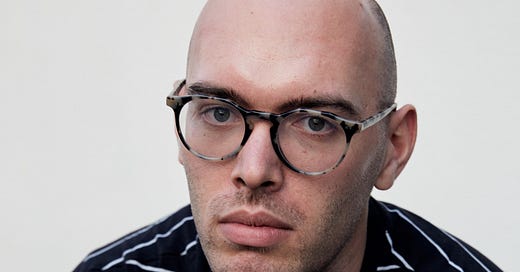Profile: Jacob Barnes
The founder and director of Grove and I discuss life goals and the art market.
Jacob Barnes is not one to rest on his laurels. Having launched the magazine Soft Punk in 2019 and written extensively as a critic, he decided to become a gallerist and founded Grove gallery in Battersea with collaborator Morgane Wagner in late 2020. Grove has since expanded to include a second venue in Berlin; meanwhile Jacob’s not even pushing thirty. Taller than most of his guests, he speaks with a soft New York accent and confesses how difficult he finds art openings, while showing me around their latest exhibition, It’s Not the Heat, It’s the Dust.
The show is varied, but contains some of an increasingly prevalent type of work: figurative painting that complements an interior but seems to lack an interiority of its own. I express my concerns about the market pushing out artists who might be more challenging but who are less easy to sell. At the first sign of disagreement, Jacob brightens: ‘There’s something to that, but I would ask if that’s always such a bad thing all the time? We love to take our work so seriously, but we often do that at the expense of things that make us feel good, and that we can engage with on personal or more emotional levels.’
Doesn’t this come at the risk of stripping art of its specialness, ceding ground to the market till it becomes just another luxury product? Jacob replies: ‘I do think that we ought to respect art's capacity to harbour and inspire modes of reflection beyond simply being objects for viewing pleasure.’ But outright rejection of less ‘critical’ art, for him, boils down to snobbery. Art operates on multiple planes, and Grove aims to ‘cover all the bases’. Some works, Jacob hopes, might be more challenging, while others are there to please, which you can buy and hang on your wall.
I am aware that I’m speaking to someone who is both a sincere lover of art and a pragmatic businessman. The laudable principle behind Grove is that every exhibiting artist is paid a wage by default, so pressure mounts on Jacob and Morgane to make sure they sell enough to cover the costs. Ultimately, he needs to follow the money, even though he hopes one day that might not be the case. He asks: what good is a venue that puts on challenging work if it can’t support the artists financially?
Jacob imagines looking back as an old man, satisfied that he has been able to support his friends and family to do what they love, having made enough money to live well and go on vacation from time to time. Like a benevolent padrone-type figure, I suggest. He winces but doesn’t deny it. If he’s in a position to make that happen, why wouldn’t he? Several members of his family work in business – his father was a hedge fund manager with ‘left-wing principles’ – and this background has taught him to think five or six steps ahead, and ‘respect a bottom line’. The approach seems to be working. On 2 June the next group show opens in Battersea, called Bite the Hand, and the following day yet another space, Grove East, is set to launch with a promising solo exhibition from artist Billy Fraser. What will be next?




